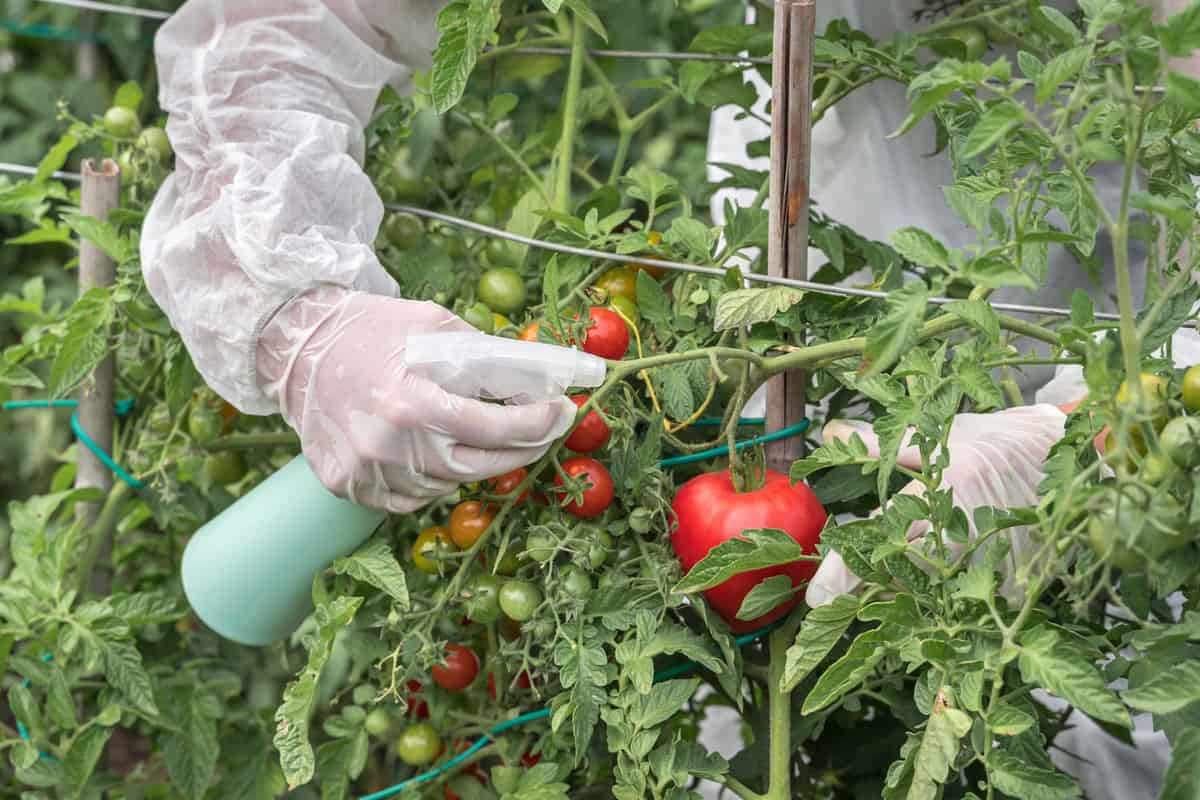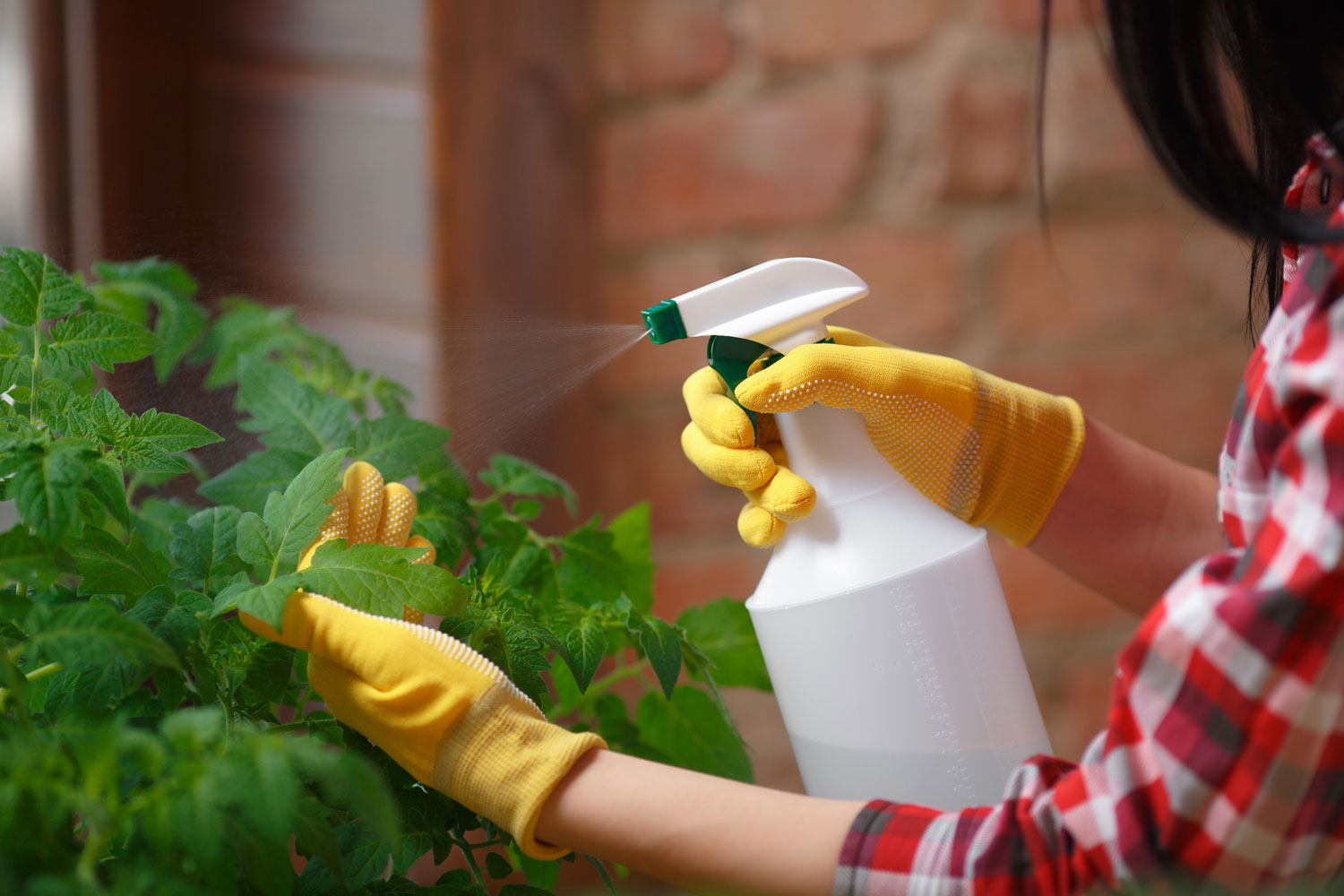Growing tomatoes in your garden can be both rewarding and challenging.
One of the obstacles you might face is dealing with harmful pests that can damage your tomato plants.

To protect your crop, you may wonder if using pest oil on tomatoes is viable.
Below, we'll talk about the answer to this question, including tips on how to handle pests on tomatoes naturally.
Tomato Plant Pests
Tomato plants are susceptible to various pests that can damage their leaves, stems, and fruit.
Some common pests affecting tomatoes include hornworm larvae, which can strip a plant bare within days, and aphids, flea beetles, and leafminers that can cause minimal damage to the foliage.

Additionally, spider mites and stink bugs may pose threats depending on your geographical location.
To manage these pests, you should regularly inspect your plants, implement proper gardening practices, and use natural or chemical controls when necessary.
Tomato pest prevention hack here: Watch This Simple Gardening Hack That Will Save Your Tomatoes From Pests
Use of Pest Oil
Pest oils, also known as horticultural oils, are refined specifically for use on plants and can be an effective way to control soft-bodied insect or mite pests.
These oils are designed to be safe for your plants when used according to the instructions.
When considering using pest oil on your tomatoes, it's always a good idea to test a small area first to ensure no adverse reactions occur.
Benefits of Pest Oil
Pest oils, like horticultural oil and neem oil, are excellent tools for controlling various insect pests and mites that affect tomato plants.
These oils are friendly to the environment and can help manage issues with pests like aphids, flea beetles, leafminers, and spider mites.
Furthermore, botanical oils like neem oil can repel many insect pests, thus reducing plant damage.
What is Neem Oil and is it Safe for Tomato Plants?
Let's look at one of the most popular pest oil available and recommended for plants.
Neem oil is a natural pesticide extracted from the seeds of the neem tree (Azadirachta indica).
The tree, native to India and other parts of Southeast Asia, has been revered for centuries for its medicinal and agricultural benefits.
The oil derived from its seeds contains several active compounds, of which azadirachtin is the most potent.
These compounds deter pests and can inhibit their life cycle, making it an effective choice for organic gardening.
Neem Oil Benefits for Tomato Plants
Neem oil is effective against a variety of common pests that afflict tomato plants, including aphids, whiteflies, spider mites, and tomato hornworms.
It also has properties that can help combat fungal infections such as early blight, which commonly affects tomato plants.
When used correctly, neem oil poses minimal risk to beneficial insects like ladybugs and bees, as it primarily impacts pests that consume the plant's tissue.
How to Apply Pest Oil
When using pest oil on your tomato plants, always ensure to follow the product's label instructions for proper application rates and methods.
Here are some general steps to apply pest oil effectively:
Timing
Choose a time early in the day or late in the afternoon when temperatures are cooler, as applying oil during hot conditions can lead to plant injury.
Dilution
Dilute the oil as recommended on the label. Too much oil can cause phytotoxicity, so it's crucial to get the concentration right.
Application
Spray the pest oil solution evenly on the entire tomato plant, paying particular attention to the undersides of leaves where pests often hide.
Reapplication
Regularly monitor the tomato plants for pests. If the problem persists, reapply pest oil as per the label instructions, but avoid exceeding the maximum number of applications recommended.
Potential Risks on Tomato Plants
Using pest oil on your tomato plants can be helpful in controlling soft-bodied insect pests.
However, it's essential to be aware of the potential risks it might pose to the plants.
Horticultural oil is a specific formulation, so using household cooking oils or other non-gardening oils can lead to plant injury due to variations in refinement and impurities.
When using pest oil on tomatoes, timing is crucial. Applying it during hot weather, when temperatures are above 90°F, can cause leaf scorching or other damage to your plants.
If the oil is applied when the plant is blooming, it might negatively affect pollinators like bees, which are crucial for your tomato plants to produce fruit.
Safety Precautions
As you use pest oil on your tomato plants, safety precautions are essential to minimize potential harm to your plants and beneficial insects. Here are a few tips to keep in mind:
- Follow the instructions on the label carefully and dilute the oil with water as directed. Undiluted oil can damage your tomato plants.
- Apply the oil during early morning or late afternoon to avoid extreme temperatures, as heat can cause leaf damage.
- Monitor the weather forecast and avoid using pest oil if rain is expected within 24 hours. Rainfall can wash off the oil, reducing its effectiveness.
- Keep an eye on your tomato plants after applying the oil to check for any signs of negative reactions or damage.
Alternatives to Pest Oil: Natural Pest Control Methods
There are several natural pest control methods that can be used on your tomato plants, apart from pest oil.
Insecticidal Soap
One such option is using insecticidal soap, which can help control many small insect pests and mites.
To use insecticidal soap, simply mix the recommended amount of soap with water, and spray it onto the affected areas of your tomato plants.
Check out this Bioadvanced Ready-to-use Insecticidal Soap on Amazon.
Spinosad
You can also try using spinosad, an organic substance derived from soil-dwelling bacteria.
Spinosad is effective against various pests, including caterpillars, leafminers, and thrips.
When applying spinosad, follow the product instructions and carefully spray it on your tomato plants.
Try this Natural Guard Spinosad Soap on Amazon.
Bacillus Thuringiensis
Bacillus thuringiensis (B.t.) is another natural pest control solution you can apply to your tomato plants.
B.t. is a bacterium that targets specific pests, such as tomato hornworms, without harming beneficial insects.
To use B.t., mix the appropriate concentration with water and spray it onto your plants.
Check out this concentrated BT spray on Amazon.
Lastly, integrating beneficial insects, like ladybugs and lacewings, into your garden can provide an effective biological control method.
These insects feed on pests such as aphids and can help to keep your tomato plants healthy and pest-free.
Use Pest Oil With Caution
Using pest oil on your tomatoes can be an effective way to control soft-bodied insect or mite pests.
Remember to use horticultural oil designed specifically for plants and not household cooking oils or other non-gardening oils.
Using horticultural oil can help in controlling these pests effectively and minimizing damage to your tomato plants.
So, go ahead and give your tomatoes a little extra protection with pest oil, and enjoy the bountiful harvest that results from your care and attention.
For more tomato hacks and growing tips, check out these other articles:
Don’t Let Blossom End Rot Ruin Your Tomato Crop: Tips and Tricks for a Healthy Harvest
Woman Grows Plentiful Tomato Bounty With This Garden Structure—See For Yourself!



